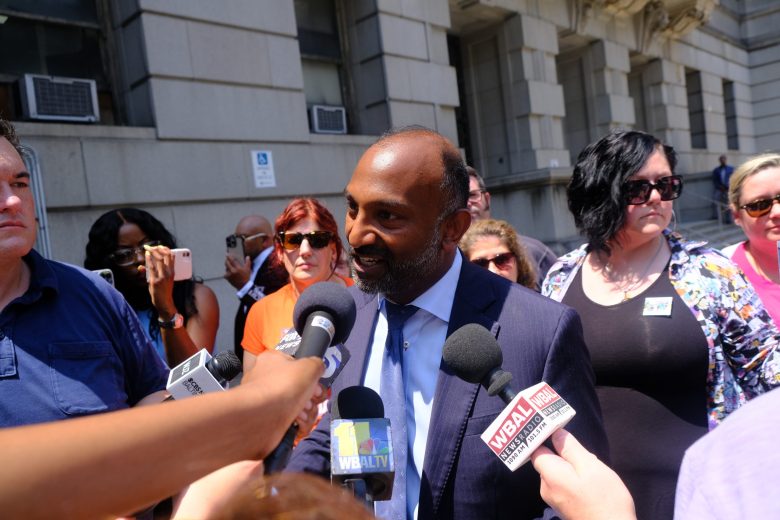By Tashi McQueen,
AFRO Political Writer,
tmcqueen@afro.com
And
By Khira Moore,
AFRO Intern
Ex-squeegee worker Tavon Scott Jr., 16, was found guilty of three of the four charges he received for shooting and killing Timothy Reynolds, 48. After about 11 hours of deliberation, the jury unanimously found Scott guilty of voluntary manslaughter, use of a firearm in a violent crime and possession of a firearm as a minor.
“We avoided the first-degree and second-degree murder convictions. He’s been convicted of manslaughter, which makes him eligible to be transferred to juvenile court,” said Warren Brown, the secondary defense attorney for Scott, outside the courthouse after the verdict. “We have the psychologist and psychiatrist reports, we have the recommendations from Juvenile Services as to where this young boy could go and be serviced… he is amenable to treatment.”
Brown said he is sure that Scott will be transferred to juvenile court instead of serving out his sentence in the adult criminal system.
“Nothing that happened in the courtroom was ever going to bring Timothy Reynolds back,” said Vignarajah, as the Reynolds family stood behind him, fighting back tears and holding hands. “The person who is responsible for his murder has been convicted of killing him and that brings a small measure of closure and justice to his family.”
“The good news is that the maximum sentence is 35 years,” he continued. “Ten years for manslaughter, 20 years for use of a firearm and five years for the [possession] of a firearm as a minor.”
According to key evidence submitted during the trial Reynolds died of five gunshot wounds, one to the face, three to the back and one to the chest. The shooting took place after Reynolds confronted a group of squeegee workers with a bat at the Light and Conway St. intersection on July 7, 2022. Scott was just 14 years old at the time of the incident— a day away from turning 15.
The Verdict
It was approaching noon when the families of the defendant and victim, reporters, and officers were called into the courtroom.
Tensions were high as officers handed tissues to the families joined in the small courtroom. The defendant was brought in, chained from his wrists to his ankles and around his waist.
Scott was dressed in a crisp dark gray suit that fit loose around his wrists. His eyes remained low, focused on his loafers on July 27. At points, he glanced back to his mother, locking eyes and blinking rapidly.
Lead Defense attorney, J. Wyndal Gordon had a family affair and wasn’t able to attend trial on the day of the verdict. The defendant was joined with Attorney Warren Brown. His posture was stiff as he spoke with Scott in hushed whispers.
Brown was adjusting the defendant’s tie when Judge Jennifer Schiffer walked in. Schiffer quickly notified the audience that the reason they were called in was to discuss a note from the jury.

The jury asked for a written definition of two terms, “mitigated circumstances” and “justified.” After deliberation with the prosecutor, Cynthia Banks, and Brown, the judge agreed and decided to refer the jury to the definition of self-defense and defense of others.
The courtroom was dismissed and everybody was prepared for another day of lengthy deliberations. Approximately five minutes later, Brown got a call.
The jury had reached a verdict.
Families, reporters, and members of the public scrambled back into the courtroom. Reporters were standing against the back wall, giving a portion of the limited seats to members of the Reynolds family.
The defendant walked into the courtroom, escorted by multiple guards. He met with Brown once more, both showing signs of nerves as they reached the moment they’d been waiting for.
When the jury walked in, the crowd watched with bated breath. Scott’s leg was shaking under the table and Warren clapped his back, a sign of comfort. Judge Schiffer asked if members of the audience would refrain from showing any emotional outbursts in an effort to respect the jury’s decision. The jury squeezed into their tight section and the clerk began the session— the final session to decide the guilt or innocence of the young man at the center of the trial, Scott vs. the State of Maryland.
Scott was found not guilty of first-degree murder, second-degree murder, and carrying an open or concealed handgun and guilty of voluntary manslaughter, firearm possession of a minor, and firearm used in a felony.
The family held back their emotions as the jury was dismissed. There were quiet sobs and heavy hearts from both sides.
The trial ended with delayed sentencing due to scheduling concerns by the defense.
Brown said it would be about 30 days before they reconvene for sentencing.
Tashi McQueen is a Report For America Corps Member.
The post Former squeegee worker, 16, found guilty of manslaughter and firearm-related charges appeared first on AFRO American Newspapers .












